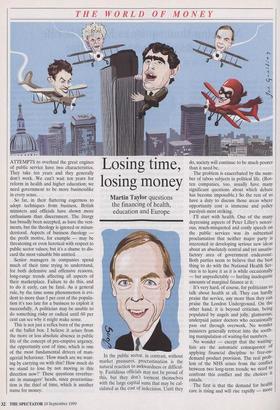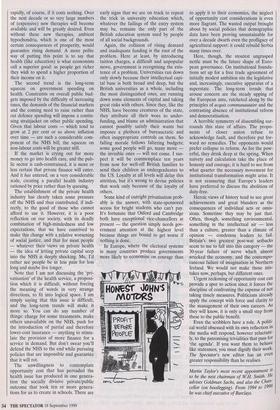THE WORLD OF MONEY
A I I bMPTS to overhaul the great engines of public service have two characteristics. They take ten years and they generally don't work. We can't wait ten years for reform in health and higher education; we need government to be more businesslike in every sense.
So far, in their flattering eagerness to adopt techniques from business, British ministers and officials have shown more enthusiasm than discernment. The liturgy has broadly been accepted, as have the vest- ments, but the theology is ignored or misun- derstood. Aspects of business theology the profit motive, for example — may be threatening or even heretical with respect to public sector values; but it's a shame to dis- card the most valuable bits untried.
Senior managers in companies spend much of their time trying to understand, for both defensive and offensive reasons, long-range trends affecting all aspects of their marketplace. Failure to do this, and to do it early, can be fatal. As a general rule, by the time some phenomenon is evi- dent to more than 5 per cent of the popula- tion it's too late for a business to exploit it successfully. A politician may be unable to do something risky or radical until 60 per cent can see why it might make sense. .
This is not just a reflex born of the power of the ballot box. I believe it arises from the more or less absolute absence in public life of the concept of pre-emptive urgency, the opportunity cost of time, which is one of the most fundamental drivers of man- agerial behaviour. 'How much are we wast- ing by carrying on with this? How much do we stand to lose by not moving in this direction now?' These questions reverber- ate in managers' heads, since procrastina- tion is the thief of time, which is another name for money.
Losing time, losing money
Martin Taylor questions the financing of health, education and Europe Iii the public sector, in contrast, without market pressures, procrastination is the natural reaction to awkwardness or difficul- ty. Fastidious officials may not be proud of this, but they don't torment themselves with the large capital sums that may be cal- culated as the cost of indecision. Until they do, society will continue to be much poorer than it need be.
The problem is exacerbated by the num- ber of taboo subjects in political life. (Rot- ten companies, too, usually have many significant questions about which debate has become impossible.) So the rest of us have a duty to discuss those areas where opportunity cost is immense and policy paralysis most striking.
I'll start with health. One of the many depressing aspects of Peter Lilley's notori- ous, much-misquoted and costly speech on the public services was its subtextual proclamation that neither major party is interested in developing serious new ideas about an absolutely central and yet unsatis- factory area of government endeavour. Both parties seem to believe that the best thing to do with the National Health Ser- vice is to leave it as it is while occasionally — but unpredictably — hurling inadequate amounts of marginal finance at it. It's very hard, of course, for politicians to talk about health at all. They can hardly praise the service, any more than they can praise the London Underground. On the other hand, it is beyond criticism, being populated by angels and jolly, glamorous, underpaid junior doctors who occasionally pass out through overwork. No wonder ministers generally retreat into the sooth- ing manipulation of waiting-list numbers.
No wonder — except that the waiting- lists are the automatic consequence of applying financial discipline to free-on- demand product provision. The real prob- lem of the NHS arises from the conflict between two long-term trends; we need to confront this conflict and the choices it entails.
The first is that the demand for health care is rising and will rise rapidly — more rapidly, of course, if it costs nothing. Over the next decade or so very large numbers of (expensive) new therapies will become available and will be greatly desired. Even without these new therapies, ambient hypochondria, which is one of the most certain consequences of prosperity, would guarantee rising demand. A more polite way of putting this point is to say that health (like education) is what economists call a superior good: as people get richer they wish to spend a higher proportion of their income on it.
The second trend is the long-term squeeze on government spending on health. Constraints on overall public bud- gets imposed by the difficulty of increasing taxes, the demands of the financial markets and the coming need to raise rather than cut defence spending will impose a contin- uing straitjacket on other public spending. Given that labour costs — which tend to grow at 2 per cent or so above inflation over time — are such a considerable com- ponent of the NHS bill, the squeeze on non-labour costs will be greater still.
If the market is crying out for more money to go into health care, and the pub- lic sector is cash-constrained, it is more or less certain that private finance will enter. And it has entered, on a very considerable scale, creating a parallel health industry rationed by price rather than by queuing.
The establishment of the private health industry has clearly taken some pressure off the NHS and thus contributed, if indi- rectly, to the good of those who cannot afford to use it. However, it is a poor reflection on our society, with its deadly combination of high-mindedness and low expectations, that we have contrived to make this change with a relative worsening of social justice, and that for most people — whatever their views on private health — the idea of letting private capital seep into the NHS is deeply shocking. Me, I'd rather see people be in less pain for less long and maybe live longer.
Note that I am not discussing the 'pri- vatisation' of the health service, a proposi- tion which it is difficult, without forcing the meaning of words in very strange directions, to fit into logical space. I am simply saying that this issue is difficult, and the long-term trends will make it more so. You can do any number of things: charge for some treatments, make others unavailable on the NHS, push for the introduction of partial and therefore lower-cost insurance — anything to stimu- late the provision of more finance for a service in demand. But don't swear you'll defend the NHS to the end while pursuing policies that arc impossible and guarantee that it will rot.
The unwillingness to contemplate opportunity cost that has pervaded the health issue has produced in one genera- tion the socially divisive private/public outcome that took ten or more genera- tions for us to create in schools. There are early signs that we are on track to repeat the trick in university education which, whatever the failings of the entry system may be, remains the only part of the British education system used by people of all social backgrounds.
Again, the collision of rising demand and inadequate funding is the root of the problem. Here at least, by introducing tuition charges, a difficult and unpopular move, government is recognising the exis- tence of a problem. Universities run down only slowly because their intellectual capi- tal base is both broad and deep, but the British universities as a whole, including the most distinguished ones, are running down some elements of capital and taking great risks with others. Since they, like the NHS, have become creatures of the state, they attribute all their woes to under- funding, and blame an administration that cannot possibly satisfy their wants but imposes a plethora of bureaucratic and often inappropriate controls on them. So falling morale follows faltering budgets; some good people will go, many more the invisible ones — will not come. I sus- pect it will be commonplace ten years from now for well-off British families to send their children as undergraduates to the US. Loyalty at all levels will delay this attrition, but it's wrong to devise policies that work only because of the loyalty of others.
Some kind of outright privatisation prob- ably is the answer, with state-sponsored access for bright students who can't pay. It's fortunate that Oxford and Cambridge both have exceptional vice-chancellors at present — the question simply needs gov- ernment attention at the highest level because things are bound to get worse if nothing is done.
In Europe, where the electoral systems in many countries produce governments more likely to economise on courage than to apply it to their economies, the neglect of opportunity cost considerations is even more flagrant. The wasted output brought about by social policies that demographic data have been proving unsustainable for over a decade dwarfs even the profligacy of agricultural support: it could rebuild Serbia many times over.
Here, though, the stoutest ungrasped nettle must be the future shape of Euro- pean governance. On institutional founda- tions set up for a free trade agreement of initially modest ambition sits the legislative and, increasingly, executive apparatus of a superstate. The long-term trends that arouse concern are the steady upping of the European ante, ratcheted along by the principles of acquis communautaire and the contrasting absence of institutional reform and democratisation.
A horrible symmetry of dissembling sur- rounds this state of affairs. The propo- nents of closer union refuse to acknowledge fault, and therefore put for- ward no remedies. The opponents would prefer collapse to reform. As for the pow- erful, they drink deep at the spring. When naivety and calculation take the place of honesty and courage, it is hard to see from what quarter the necessary movement for institutional transformation might arise. It is not reassuring that Europe's leaders have preferred to discuss the abolition of duty-free.
Heroic views of history tend to see great achievements and great blunders as the consequences of individual acts or omis- sions. Sometime they may be just that. Often, though, something environmental, something in the intellectual air — less than a culture, greater than a climate of opinion — condemns leaders to fail. Britain's two greatest post-war setbacks seem to me to fall into this category — the 30-year failure of nerve which almost wrecked the economy, and the contempo- raneous failure of imagination in Northern Ireland. We would not make those mis- takes now, perhaps, but different ones.
Urgent reckoning of opportunity cost can provide a spur to action since it forces the discipline of confronting the expense of not taking timely measures. Politicians already apply the concept with force and clarity to the management of their own careers. As they will know, it is only a small step from these to the public benefit. Even the scribblers have a role. A politi- cal world obsessed with its own reflection in the media will respond, however reluctant- ly, to the patronising trivialities that pass for `the agenda'. If you want them to behave like statesmen, you must dignify their work. The Spectator's new editor has an even greater responsibility than he realises.
Martin Taylor's most recent appointment is to be the next chairman of W.H. Smith. He advises Goldman Sachs, and also the Chan- cellor (on bootlegging). From 1994 to 1998 he was chief executive of Barclays.



























































































 Previous page
Previous page